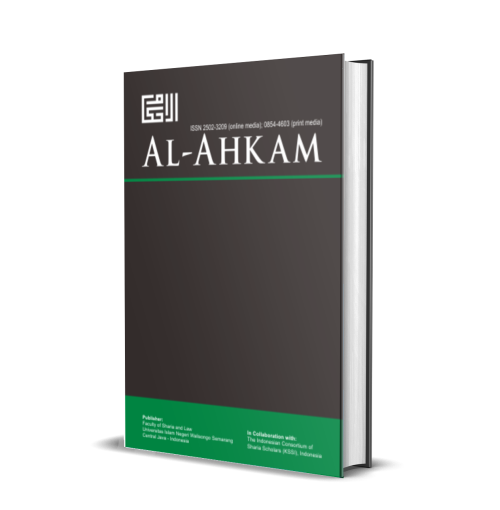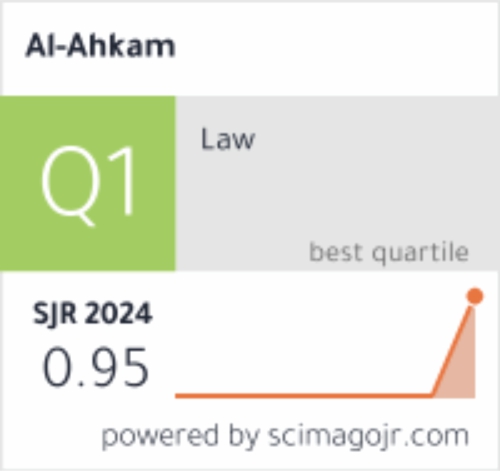Al-Khurūj ‘alā al-Ḥākim fī al-Fiqh al-Siyāsī al-Islāmī: Dirāsah ‘alā Ma’nā al-Thawrah
DOI:
https://doi.org/10.21580/ahkam.2023.33.1.14948Keywords:
al-bāghī, al-ḥirābah, al-khawārij, al-khurūj ‘alā al-ḥākim, revolutionAbstract
The Arab Spring emerged due to a political crisis in most Arab countries that wanted a change from dictatorial regimes to democratic systems in their countries. One of the most prominent issues that caused controversy during the revolution was the issue of al-khurūj 'alā al-ḥākim. This article aims to analyze the meaning of revolution from an Islamic political perspective by discussing the concept of al-khurūj 'alā al-ḥākim, especially towards the three terms: al-bāghī, al-khawārij and al-ḥirābah. This article clarifies the relationship between these three terms with the phenomenon of revolution in the contemporary Islamic world. This article uses a jurisprudential approach with an inductive method by extrapolating jurisprudential sources and references related to the research subject. This article concludes that the notion of revolution is not the same as the concept of al-khurūj 'alā al-ḥākim in Islamic jurisprudence. The reason is that revolution aims to change the political, social and economic reality. In contrast, khurūj is a form of resistance to the leader and does not carry out all the rights demanded of the ruler. In the present context, the redefinition of the concept of al-khurūj 'alā al-ḥākim in Islamic jurisprudence is necessary to suit the modern era.
Downloads
References
‘Ābidīn, Muhammad Āmīn Ibn. Radd al-Mukhtār ‘alā al-Dār al-Mukhtār. Riyāḍ: Dār ‘Ālam al-Kutub, 2003.
‘Audah, ‘Abd al-Qādir. al-Islām wa Awḍā’unā al-Siyāsah. Cairo: Mu’asasah Handāwī li al-Ta’līm wa al-Thaqāfah, 2014.
‘Audah, ‘Abd al-Qādir. al-Tashrī’ al-Jinā’ī al-Islāmī. Beirut: Mu’assasah al-Risālah, 2000.
Black, Antony. The History of Islamic Political Thought: From the Prophet to the Present. Edinburgh: Edinburgh University Press, 2011.
Burdah, Ibnu. “al-Ab‘ād al-Ṭā’Ifiyyah al-Islāmiyyah fi’l-Thaurah al-Shu‘ubiyyah al-‘Arabiyyah 2010-2011.” Al-Jami’ah: Journal of Islamic Studies 50, no. 1 (2012): 197–217. https://doi.org/10.14421/ajis.2012.501.197-217.
Burdah, Ibnu. “New Trends in Islamic Political Parties in the Arab Spring Countries.” Al-Jami’ah: Journal of Islamic Studies 52, no. 2 (2014): 459–85. https://doi.org/10.14421/ajis.2014.522.459-485.
al-Damījī, ‘Abdullāh ibn ‘Umar. al-Imāmah al-‘Uzmā ‘inda Ahl al-Sunnah wa al-Jamā’ah. Riyāḍ: Dār al-Ṭayyibah, n.d.
al-Dusūqī, Shams al-Dīn. Ḥāshiyyah al-Dusūqī ‘alā al-Sharḥ al-Kabīr. Cairo: ‘Īsa al-Bābī al-Ḥalabī, n.d.
Dwi Kurnia, Ryzka. “Konsep Ideal Imamah (Kepemimpinan) Menurut Al-Mawardi.” Politica: Jurnal Hukum Tata Negara dan Politik Islam 6, no. 1 (2019): 72–89. https://doi.org/10.32505/politica.v6i1.2728.
Farḥah, Jamāl Ḥusainī Abū. Khurūj ’alā Al-Ḥākim Fī Al-Fikr Al-Siyāsī Al-Islāmī. Cairo: Markaz al-Ḥaḍārah al-’Arabiyyah, 2004.
Halim, Fatimah. “Hukum dan Perubahan Sosial.” Al-Daulah 4, no. 1 (2015): 107–15. https://doi.org/10.24252/ad.v4i1.1492.
Jumali, Endang. “Hirābah dan Hubungannya dengan Hukuman Ta‘zīr bagi Pelaku Korupsi dalam Hukum Pidana Islam (Kajian Tafsir Ahkam terhadap QS. Al-Māidah Ayat 33).” Asy-Syari’ah 18, no. 1 (2015): 149–56. https://doi.org/10.15575/as.v18i1.657.
Lundgren, Magnus. “Mediation in Syria: Initiatives, Strategies, and Obstacles, 2011–2016.” Contemporary Security Policy 37, no. 2 (2016): 273–88. https://doi.org/10.1080/13523260.2016.1192377.
al-Māwardī, Abū al-Ḥasan ‘Alī ibn Muḥammad ibn Ḥabīb al-Basharī al-Baghdādī. al-Aḥkām al-Sulṭāniyyah wa al-Wilāyāt al-Dīniyyah. Beirut: Dār al-Kutub al-‘Ilmiyyah, 2000.
Mutakin, Ali. “Islam dan Demokrasi: Kajian Fikih Siyasah tentang Tantangan dan Hambatan Demokratisasi di Dunia Islam.” Jurnal Al-Ashriyyah 2, no. 1 (2016): 25–42. https://doi.org/10.53038/alashriyyah.v2i1.10.
al-Najār, Yāsir ‘Abd al-Ḥamīd. “Ḥukm al-Khurūj ’alā al-Ḥākim fī al-Fiqh al-Islāmī: Dirāsah Fiqhiyyah Muqāranah.” Majallah Jāmi’ah al-Madīnah al-‘Ālamiyyah 12, no. 1 (2015): 161–87. http://ojs.mediu.edu.my/index.php/majmaa/article/view/114.
al-Nawawī. Rawḍat al-Ṭālibīn. Beirut: Dār al-Kutub al-’Ilmiyyah, 2006.
al-Nawawī. Sharḥ Ṣaḥīḥ Muslim. Cairo: Dār al-Ḥadīth, 2001.
Pramono, Muhamad Fajar, and Amir Sahidin. “Maqāṣid al-Sharī’ah Values in al-Māwardī’s Concept of the Caliphate.” Al-Ahkam 31, no. 2 (2021): 203–22. https://doi.org/10.21580/ahkam.2021.31.2.8612.
Qudāmah, Muḥammad ibn. al-Mughnī. Riyāḍ: Dār ’Ālām al-Kutub, 1997.
Royani, Yayan Muhammad. “Hate Speech during the Caliphate of ‘Alī Ibn Abī Ṭālib and Its Relevance to Regulations in Indonesia: The Study of the Islamic Law History.” Al-Ahkam 31, no. 2 (2021): 223–40. https://doi.org/10.21580/ahkam.2021.31.2.8956.
al-Sayyid, Ruqayyah Khālid, and Ṣaydā Riḍā Marbīd al-‘Inzī. “al-Khurūj ’alā al-Ḥākim (Dirāsah ‘alā Ḍaw’ al-Sunnah).” al-Majallah al-Alaktrūniyyah al-Shāmilah Muta’adidah al-Ma’rifah li Nashr al-Abhāth al-‘Ilmiyyah wa al-Tarbawiyyah (MECSJ) 16 (2019): 1–19.
Sa’id, al-Sayyid Ḥamdan al-Sayyid, and Aḥmad Ibrāhim Yūsuf Sa’idiyyah. “al-Khurūj ‘alā al-Ḥukkām wa Atharuhu fī Tafrīq al-Ummah: Dirāsah fi Ḍaw’ al-Sunnah al-Nabawiyyah.” Majallah Jāmi’ah Ṭayyibah 13, no. 6 (2016): 339–85.
Sahide, Ahmad, Bambang Cipto, Siti Muti’ah Setiawati, and Syamsul Hadi. “The Arab Spring: Membaca Kronologi dan Faktor Penyebabnya.” Jurnal Hubungan Internasional 4, no. 2 (2015): 118–29. https://doi.org/10.18196/hi.2015.0072.118-129.
Sahrasad, Herdi. “Arab Spring: Perubahan Rezim dan Tegangan Hubungan As – Dunia Arab Refleksi Sosio-Historis.” Center of Middle Eastern Studies (CMES) 6, no. 1 (2013): 36–54. https://doi.org/10.20961/cmes.6.1.11686.
al-Sharbaynī, al-Khaṭīb. Mughnī al-Muḥtāj. Beirut: Dār al-Ma’rifah, 1997.
Tabassum, Sadia. “Combatants, Not Bandits: The Status of Rebels in Islamic Law.” International Review of the Red Cross 93, no. 881 (2011): 121–39. https://doi.org/10.1017/S1816383111000117.
Umar, Ahmad. R Mardhatillah, Arief Bakhtiar Darmawan, Faela Sufa Sufa, and Gebyar Lintang Ndadari. “Media Sosial dan Revolusi Politik: Memahami Kembali Fenomena ‘Arab Spring’ dalam Perspektif Ruang Publik Transnasional.” Jurnal Ilmu Sosial dan Ilmu Politik 18, no. 2 (2016): 114–29. https://doi.org/10.22146/jsp.13130.
Yasmine, Shafira Elnanda. “Arab Spring: Islam dalam Gerakan Sosial dan Demokrasi Timur Tengah.” Masyarakat, Kebudayaan dan Politik 28, no. 2 (2015): 106–13. https://doi.org/10.20473/mkp.V28I22015.106-113.
al-Zuḥaylī, Wahbah. al-Fiqh al-Islāmī wa Adilatuhu. Beirut: Dār al-Fikr, 1997.
Zulfikar, Azmi Yudha. “Tindak Pidana Pemberontakan dalam Perspektif Hukum Positif dan Hukum Islam.” Jurnal Al-Fikrah 2, no. 2 (2013): 111–24. https://ejournal.iaialaziziyah.ac.id/index.php/jiaf/article/view/312.
Downloads
Published
How to Cite
Issue
Section
License
By submitting an article to the journal, the author(s) agree to transfer the published article's copyright to the journal, which will act as the publisher. This means the journal will have the right to publish the article in various forms, including reprints. The journal will maintain the publishing rights to the published articles.
In line with the license, authors and third parties (readers, researchers, and others) are allowed to share and adapt the material. In addition, the material must be given appropriate credit, provided with a link to the license, and indicated if changes were made. If authors remix, transform or build upon the material, authors must distribute their contributions under the same license as the original.



